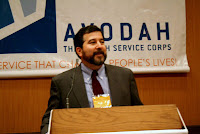In today’s Jerusalem Post, Samuel Freedman, the author of Jew Vs. Jew, wrote the best article about the new Hechsher Tzedek that I have yet to see. Freedman does a balanced job of explaining the rationale behind Rabbi Morris Allen’s idea for a “new form of kosher certification, which reflect[s] a commitment to justice on behalf of kosher food companies rather than solely their adherence to the laws of kashrut in food preparation.”
What I liked most about Freedman’s article is how he returned to the civil rights era and Martin Luther King, Jr. to portray the history of what we now call tikkun olam (social justice) in Judaism. The Jewish men and women who joined the Civil Rights Movement were passionate about their activism but, for the most part, dispassionate about the basis for their activism in their Jewish heritage. Freedman writes,
One of the whopping paradoxes of the civil rights movement was that the Jews who comprised a disproportionate share of white activists and volunteers were largely ignorant of the theological roots of their idealism. With some rare rabbinic exceptions like Abraham Joshua Heschel and Jack Rothschild, they had to learn their own Bible from the black Christians in the campaign.
As Freedman understands it, there has long been a disconnect among Jews between the social activism that is practiced and the textual tradition that promotes such activism.
In the parts of the Jewish spectrum with the strongest involvement in tikkun olam, particularly among the secular and unaffiliated, there is the least awareness of the Judaic foundations of that concept. (In fact, there is often an antipathy to religion itself as mere superstition.) In the parts with the deepest knowledge of text and tradition, particularly the Orthodox sector, a formidable apparatus of charities exists almost entirely to serve internal needs.
 Freedman points to the American Jewish World Service, led by social justice trailblazer Ruth Messinger, which has become such a phenomenon because it has “overtly connected activism to a disciplined, ongoing study of Jewish texts.” I agree. I would also add the work of two Conservative rabbis in two other Jewish organizations that are both successfully connecting their passion for activism with their devotion to Torah. Avodah: The Jewish Service Corps, started by Rabbi David Rosenn (left), integrates work for social change, Jewish learning, and community building. Rabbi Jill Jacob’s work with Jewish Funds for Justice helps achieve social and economic security and opportunities for the poor in our country, but is deeply grounded in her scholarly and passionate Torah. Jill’s ability to mesh her Torah with her Jewish values of tzedek are often expressed on the jspot blog (although I disagree with her take on Thanksgiving).
Freedman points to the American Jewish World Service, led by social justice trailblazer Ruth Messinger, which has become such a phenomenon because it has “overtly connected activism to a disciplined, ongoing study of Jewish texts.” I agree. I would also add the work of two Conservative rabbis in two other Jewish organizations that are both successfully connecting their passion for activism with their devotion to Torah. Avodah: The Jewish Service Corps, started by Rabbi David Rosenn (left), integrates work for social change, Jewish learning, and community building. Rabbi Jill Jacob’s work with Jewish Funds for Justice helps achieve social and economic security and opportunities for the poor in our country, but is deeply grounded in her scholarly and passionate Torah. Jill’s ability to mesh her Torah with her Jewish values of tzedek are often expressed on the jspot blog (although I disagree with her take on Thanksgiving).
The Conservative Movement, through the Hechsher Tzedek, is also bridging the divide between justice work and the Torah’s mandate to pursue justice (Deuteronomy 16:10). There is textual bases for the Hechsher Tzedek in our sifrei kodesh (the Jewish textual tradition from the Bible to the Talmud and through the rabbinic codes of law and modern-day commentaries). So rather than call Conservative Judaism a “wishy washy” branch on the American Jewish scene, I choose to look at it as the best of both worlds. We can have the commitment to social justice that is so prioritized in the Reform Movement while also having the commitment to Jewish law and lore (the Halakhic and Midrashic traditions), which is the primary focus of Orthodoxy.
Perhaps Samuel Freedman’s article serves as the best response to the comments posted to this blog regarding my thoughts on Rabbi Harold Kushner’s article in the recent Conservative Judaism journal.
How does the Conservative Judaism of today differ from an increasingly more traditional Reform Judaism? Conservative Judaism emphasizes a commitment to the system of mitzvot (Halakhah), while also emphasizing social justice and k’vod habriyot (human dignity). And while we’re at it, How does Conservative Judaism differ from Orthodox Judaism? Conservative Judaism wants its adherents to be committed to the 613 mitzvot and to engage in an ongoing ascension up the ladder of Jewish commitments (Shabbat and holy days, Kashrut, prayer, study, tzedakah, etc.) while still being able to brush their teeth on Shabbat without buying one of these.